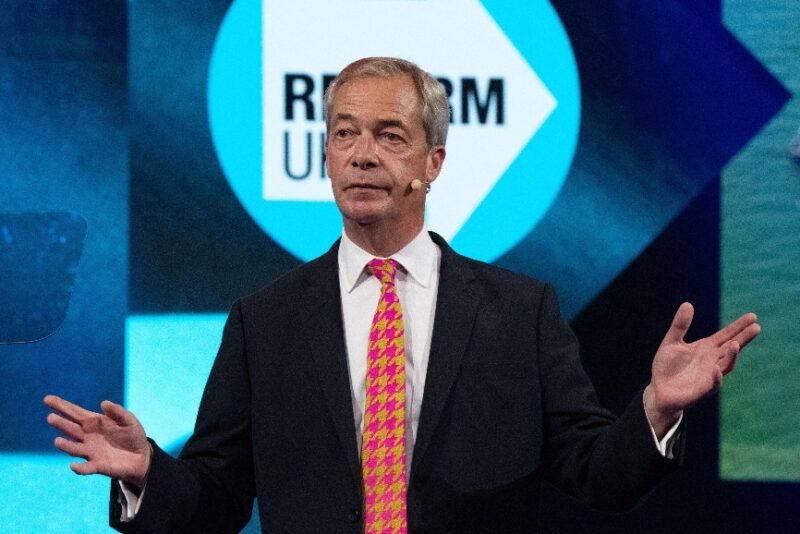In the port town of Dover—long a frontline in Britain’s immigration battles—Nigel Farage, leader of Reform UK, delivered a speech that may be remembered as the moment the country’s political trajectory changed. With the English Channel behind him and the nation’s growing frustrations in front of him, Farage unveiled a bold and unapologetic four-point immigration reform plan that promises to redefine the national conversation on borders, sovereignty, and the rule of law.
“We will bring a total end to all asylum claims from people who come here on travel visas or as students,” Farage declared, setting the tone for what he called a “new era of national control.” The proposal, unprecedented in its clarity and scope, also includes Britain’s withdrawal from the European Convention on Human Rights (ECHR), the repeal of the Human Rights Act, a renewed focus on deporting illegal migrants, and the creation of a new cabinet-level post: a “Deportations Minister,” or as some supporters are calling it, a “Deportation Tsar.”
Reform’s Rise: From Outsiders to Contenders
Farage’s announcement came just days after a political earthquake: a Find Out Now poll placing Reform UK ahead of both Labour and the Conservatives, at 28%, with the two establishment parties tied at a dismal 20%. That polling shock reflects more than voter disillusionment—it signals a growing demand for radical, clear-cut action in areas where successive governments have failed.
For years, Farage has been a thorn in the side of the British political elite. First through UKIP and Brexit, then through persistent critiques of the “Westminster bubble,” Farage has tapped into the deeply felt sense that ordinary citizens have lost control over their borders and their destiny. Now, Reform UK, under his leadership, is no longer just a protest movement; it is emerging as a government-in-waiting.
Britain’s Migration Crisis: A Legacy of Failure
The backdrop to Farage’s speech is a country simmering with frustration. Over the past decade, Britain has seen wave after wave of immigration reform initiatives, each promising to “take back control,” and each ending in disappointment. The Conservative government under Rishi Sunak and now Keir Starmer’s Labour have both proved unable—or unwilling—to curb illegal migration, particularly via small boats crossing the Channel.
In 2023 alone, more than 45,000 people made the crossing, a figure that many experts believe is an undercount. The government’s response, including the now-infamous Rwanda deportation scheme, has been mired in legal challenges and bureaucratic red tape. The result: a system overwhelmed, and public trust eroded.
This failure is precisely what Farage has seized upon. By framing immigration not only as a border issue but as a sovereignty and security crisis, Reform UK has captured a growing national mood that mainstream politicians appear increasingly out of touch with. According to a recent YouGov poll, nearly half of Britons now say immigration has been “mostly bad” for the country—a stark reversal from attitudes just six years ago.
The ECHR Debate: Sovereignty vs. Subjugation?
A centerpiece of Farage’s proposal is the UK’s withdrawal from the European Convention on Human Rights. Critics, especially from the liberal-left and legal establishment, have condemned the idea as extreme. But to Farage and his growing base, it represents the restoration of parliamentary sovereignty and democratic accountability.
“Why should Strasbourg judges decide who stays in Britain?” asked Farage in his Dover address. “We have our own Parliament, our own judges, and our own people—we don’t need to be shackled by foreign courts that no one voted for.”
Legal scholars like Richard Ekins of Oxford University have echoed this sentiment, arguing that the ECHR has “substantially constrained the UK’s ability to control its borders and deport those with no legal right to stay.” Ekins contends that the Convention, while well-intentioned, has evolved far beyond its postwar origins into a quasi-legislative force that overrides domestic law.
Deportation Tsar: A Symbol of Political Will
Perhaps the most headline-grabbing element of the plan is the proposed appointment of a “Deportations Minister”—a dedicated, high-level figure charged with ensuring that those who enter the country illegally are swiftly and consistently removed.
To Farage, this is not just about logistics—it’s about signalling seriousness. “Without real enforcement,” he said, “any immigration law is just a piece of paper.” While critics have accused him of populist grandstanding, his supporters view it as long-overdue political will, sorely lacking in the current government.
Matthew Goodwin, political scientist and author of Values, Voice and Virtue, noted that Farage’s latest move is strategic as well as ideological. “These policies are designed to shore up Reform’s right flank while also cutting into Labour’s working-class base,” Goodwin said. “Immigration is now the single most cross-cutting issue in British politics.”
Media and Establishment Panic
Unsurprisingly, establishment voices have reacted with alarm. The Economist, in a recent profile, called Farage “the man Britain cannot ignore”—a backhanded compliment laced with warnings about “authoritarian drift” and “populist nationalism.” Yet even critics now admit that Farage’s rise is not a passing moment. He is no longer simply disrupting the conversation—he’s dominating it.
Mainstream parties are scrambling to respond. Labour’s Keir Starmer has hardened his rhetoric slightly, promising “fair but firm” border policies, while the Conservatives remain caught between appeasing moderates and fending off their right. But none has articulated a vision as comprehensive—or as bold—as Farage’s.
A New Political Realignment?
What we are witnessing may be more than a “populist surge”. It could be the beginning of a genuine political realignment. Just as Brexit redrew the political map in 2016, Reform UK’s rise could render obsolete the old Tory-Labour duopoly. The failure of both parties to deliver on immigration—and their perceived submission to supranational institutions—has opened the door to a third force grounded in national interest, democratic accountability, and cultural sovereignty.
Farage’s message resonates because it is both simple and deeply resonant: Britain is broken, and only Reform can fix it. Whether or not voters ultimately agree, one thing is clear—Thursday’s speech in Dover was not just another campaign event. It was a declaration of intent, a gauntlet thrown at the feet of a complacent political class, and perhaps the first step toward a very different Britain.
In the weeks ahead, Farage has promised to unveil more detailed policy plans—on housing, NHS reform, energy independence, and crime. But it is immigration that remains the core of Reform UK’s appeal: not just as a policy issue, but as a symbol of a broader battle over national identity and control.
As the summer election season looms, and with Reform UK pulling ahead in the polls, the question is no longer whether Nigel Farage can shake up the system—it’s whether he’s ready to lead it.




